- Home
- William Shatner
Up Till Now Page 22
Up Till Now Read online
Page 22
What do I do? He had challenged me to risk my professional image. Am I stupid enough and egotistical enough and curious enough to find out whether I can put the gloves on with him or not? If I agreed to join him in this fantasy I was risking offending many people who didn’t understand Howard Stern, but if I refused I would be seen as an uptight visitor from another world, a man who took himself much too seriously. In front of thirty million listeners I was about to be humiliated.
I told Howard’s sidekick, Robin, “If you hear screams for help . . .” and decided to go along with him on this fantasy trip. Meanwhile trying to remember I was there to promote my book and somehow I had to do that.
“The first order of business down here . . .” Howard explained, “. . . let’s give each other girl’s names first. Instead of Bill, you’ll be Jill Shatner. You’re Jill, all right?”
Who booked me on this show? All I wanted to do was promote my little book. It’s a good read. Jill Shatner? The captain of the Enterprise, Jill Shatner? I realized that my only possible salvation was to play this game on his level. And then it became a game: can I amuse myself and amaze the audience? I did not let things like, oh . . . dignity hold me back. At that point Howard announced, “I’m going to sing a love song to Jill.”
And I pointed out, “Gosh, I came here to plug a book.” “Don’t worry,” Howard told me. “You’re going to plug the book.” “Yeah,” I agreed cautiously, “but where are you going to put the book?”
Later, after we’d gone through several very raunchy but also very funny minutes—there are people who heard this who are still laughing about that ridiculous banana—Robin complimented me. “You’re fitting right in down there.”
I had to admit, “Fitting in isn’t quite the expression I would use.” Rather than being humiliated, because I choose not to try to defend my image, actually to defend any image of any kind, it turned out to be a very funny appearance. Because of that I’ve been invited back on the show several times. I was even given the honor of accepting the 2003–2004 Award for the Best Farting Moment for Will the Farter. In accepting the award I admitted it did have the sweet smell of success—and then I immediately began promoting my new album, Has Been.
So I wasn’t above using Howard to promote my products, either. Eventually Howard and I actually became friends, although the fact that we’ve had dinner together has never stopped him from trying to humiliate me.
Believe me, after just one visit to Howard’s homo room, you no longer have to worry that doing commercials is going to hurt your public image. So, for example, I had absolutely no hesitation when Kellogg’s asked me to become the spokesperson for their All Bran cereal in Canada and the U.K. When I asked them why, of all the wonderfully talented, handsome, virile actors in the world they chose me to be their All Bran man, a representative explained, “Because you’re a regular guy!”
Think about it.
Financially, the most desirable situation for an actor is to become the spokesperson for a company. To become so closely associated with one company that when people see you they almost automatically think of those commercials. For example, Lee Iacocca and Chrysler, Colonel Harlan Sanders and KFC, O. J. Simpson and Hertz, or what’s his name, that tall guy, and Allstate Insurance. And me and Price-line.com.
Everybody knows about Priceline.com, the name-your-own-price-for-everything-from-airline-tickets-to-groceries Internet company. Well, at least they do now. But when the company was founded in the midst of the dot-com boom of the 1990s, it was just another one of the countless start-ups based on an original idea, desperately trying to attract attention.
My experience with computers was limited to—all together now— plugging it in. I didn’t know what the Internet was. Apparently Priceline.com was looking for someone to do a series of radio commercials, someone, according to their chief marketing officer, who was “trustworthy, known for having futuristic ideas, and instantly identifiable across several generations.” Once again, thank you, Star Trek. Their two choices were Bill Cosby and myself.
We met several times at my house. Finally I agreed to do the commercials in exchange for a substantial number of stock options in the company. At that point the stock had no value—but at least it wasn’t uranium.
I did all the radio spots in one day. I was making a film in New Zealand and went into a studio in Wellington to record them. Price-line’s executives were in a studio in Boston listening and making suggestions. I’d done numerous jobs like this, and then very quickly forgot all about them. I didn’t think this one would be any different. Truthfully, I didn’t even know what a dot-com company was. In fact, when I recorded the commercials I suggested they drop the words, “dot-com,” to save a few seconds. Hey, who needs them, I wondered.
Um, Bill. That’s the name of the company.
Oh. I thought “Priceline” was the name of the company. Priceline-dot-com is the name of the company.
Well, what does that mean, dot-com?
It means Priceline is an Internet company.
So why don’t we say that? Dot-com made no sense to me. But I did my job.
The commercials were successful, but radio and newspaper advertising has limited impact, so Priceline.com decided to advertise on television. It turned out that the copywriter on the account, Ernest Lupinacci, was a big fan of my 1968 album The Transformed Man. The “cult classic,” as I like to refer to it. As he later told me, he’d also seen me on the Science-Fiction Movie Awards, and “the image was burned into my retina.” Ernest Lupinacci deserves a tremendous amount of credit—especially for admitting that in public. Using that album for inspiration, he wrote a series of moody TV commercials in which I appeared as a sort of sorry lounge singer, talk-singing the money-saving praises of Priceline.com—in my own inimitable style—to the melodies of well-known songs of the 1960s and ‘70s.
Priceline.com offered me a large number of additional stock options to do the TV spots. Indeed, they were playing my song. I immediately suggested they double it, and they agreed. Two decades earlier people had ridiculed that album, suggesting that I sounded “in dire need of padded restraints,” but because I had taken the risk and done The Transformed Man I was finally able to truly appreciate the meaning of the word “laughingstock.” Because that’s what I was being paid—laughing stock.
The commercials actually were very good. In one of them, for example, I was very hip. “I wanted to chill but making all of my own travel arrangements was freaking me out, so I went to Priceline.com...You want some of this? You know what to do, dawg!”
In another one I was Pete Townsend-raucous, at the end of the spot grabbing a guitar from a band member and smashing it, declaring defiantly, “If saving money is wrong, I don’t want to be right...”
“When the moon is in the Seventh House . . .” began the Priceline.com version of “Age of Aquarius,” “. . . it’s a whole new age of consumer power. With Priceline.com millions of beautiful people have named their own price and saved a load of bread...”
We did ten different spots. The reception was immediate and extraordinary. The objective was to bring attention to this new company, and it worked. Within a week I had been invited to appear on Good Morning America, CNN, Entertainment Tonight, Howard Stern, and several other shows to discuss the campaign. Jay Leno played two of the spots on the Tonight Show. Eventually the commercials were parodied on Saturday Night Live and even became an answer on Jeopardy. Slightly more than a year after they began running, Price-line.com was the second-most-recognized Internet company—behind only Amazon.com. More than half of all adults in the country had heard of it. The value of the stock eventually rose to $162. Wait, let me write it out, one hundred and sixty-two dollars per share. At that value Priceline.com was worth more than General Motors. The shares held by the owner of the company were worth approximately $12 billion. His ambition, he told me one night, was to build a university. Not endow a university, build it. On paper, and in my head, I was a rich man. No longer would I be
Bill “I lost my life savings in uranium” Shatner; instead I had become Bill “the savvy dot-com millionaire” Shatner. Now who didn’t know how to made a great investment? I would never have to worry about having eighteen hundred dollars in the bank again. In fact, I wasn’t even certain the bank vault was large enough to hold all my money. I might have to buy a new bank!
However, there was one problem, just one slight problem. According to some ridiculous Federal Trade Commission rules people who held a certain type of insider stock weren’t allowed to sell for an extended period of time. A lockup, it’s called. And every single one of my $162 shares was locked up. I couldn’t sell a single share. And as I watched helplessly, and with astonishment, the value of the stock fell to five dollars. Let me use the symbol, $5. Eventually it went down to pennies. Here’s how bad it got: the company had given me the use of a car—they asked for it back. As it turned out, the uranium deal had been a lot less painful. In that deal I was rich for only a few hours.
Call me “Lost my life savings in uranium” Shatner. But don’t call collect!
Actually, the stock did edge up and eventually I earned some money. But my association with Priceline.com has lasted more than a decade. All of this, of course, all of the wonderful opportunities I was being offered, was because of Star Trek. The continued identification with Star Trek was so strong, in fact, that when Priceline.com began offering customers the option of choosing a specific flight or hotel at a guaranteed price they did a series of commercials in which I was supposedly fired as their spokesperson. I was irate. “I’m the voice of Price-line.com,” I said incredulously. “Who could possibly replace me?”
That’s when Leonard Nimoy stuck his head in the door. “Hi, Bill,” was all he had to say.
I’ve been doing Priceline.com commercials for more than a decade; meaning, I’ve been a corporate spokesperson longer than such great advertising icons as the Geico gecko and the Aflac duck! Mr. Clean has me beat, though.
The original Star Trek TV series, of course, turned out to be only the beginning. Just like me, for a long time Paramount didn’t realize the value of the franchise. They knew that the audience for the syndicated series had continued growing, but they had absolutely no understanding of the real passion people had for it. For a long time they were very happy to continue exploiting what they already had, rather than spending any more money on it. Through the years there’d been all kinds of rumors that they were going to put the show back on the air or make a feature-length movie. I knew only what I read in the newspapers. Obviously I was hoping they went ahead with . . . with anything. They couldn’t make Star Trek without Captain Kirk. In 1975 Roddenberry was hired to write the script for a low-budget feature. Roddenberry came up with a very unusual plot—the bad guy turned out to be God.
After that had been rejected the great science-fiction writer Harlan Ellison was asked to pitch his concept for the movie. Ellison’s story had the Enterprise time-traveling back to prehistoric times to fight a race of evil reptiles, giant snakes. At about this time Erich von Däniken’s book Chariot of the Gods, which claimed that alien visitors from outer space had visited the ancient Mayans—I’d narrated the movie version—was creating a sensation. Trying to exploit that, during a meeting at Paramount an executive asked Ellison if he could include some Mayans in his story.
Ellison explained patiently that in prehistoric times there were no Mayans.
Apparently that didn’t bother the studio executive, who insisted, “Nobody’ll know the difference.”
While Paramount was slowly developing its low-budget Star Trek, Star Wars was released. It became an instant classic. But rather than taking advantage of this incredible new excitement about science fiction, the studio dropped the project. Instead, a year later, Paramount president Barry Diller and executives Michael Eisner and Jeffrey Katzenberg announced that the studio was going to form a fourth television network and Star Trek: Phase II was going to be its first original series. They ordered a two-hour TV movie and thirteen episodes of the new series.
Now, I want you to think about this: what could possibly be a worse idea than making a movie with God as the bad guy? Here it is: the studio was involved in a lawsuit with Leonard over the merchandising revenue. As a result they decided to basically eliminate Spock from the new series. They offered Leonard a contract that guaranteed he would appear in a minimum of two episodes out of every eleven. They offered him a part-time job. It was ridiculous. Star Trek without Spock was like... was like, Priceline.com without Shatner. America would never stand for that. The United Federation of Planets would never stand for that. Leonard was furious and turned them down.
And then Close Encounters of the Third Kind was released. So much for Paramount’s fourth network. Now it was simply a matter of producing a feature film as quickly as possible. The studio budgeted the film at $15 million and hired the great director Robert Wise to direct it. Wise had never seen an episode of Star Trek, but his wife was a big fan and told him the film wouldn’t work without Spock. Eventually Paramount settled the lawsuit with Leonard and he signed to do the picture.
For the animated series I’d been in great physical condition. I was drawn in absolutely perfect shape. In real life, though, I was actually in pretty poor shape. Marcy pointed out that I’d better start training. I began dieting, which meant basically eliminating food from my diet, and started jogging six or seven miles a day. Finally, when I got really desperate I went to a weight-loss center in the Malibu hills, a place that guaranteed you would lose twenty pounds in a week. There really is only one way you can lose that much weight that quickly, and generally it’s illegal under the Geneva Convention. For a week all I did was hike, drink water, and eat carrot sticks; hike, drink water, and eat more carrot sticks. They didn’t have single rooms in this place, and because I insisted on staying by myself they cleared out a storage closet for me. I put in a cot and slept there.
I can just imagine what the other people who were there that week must have said when they got home: poor Bill Shatner was there and he must really be doing badly. He had to sleep in a closet.
I lost twenty-five pounds that week. When I went home I was definitely in fighting shape—I could’ve killed somebody for a decent meal.
The $15 million budget eventually swelled to $45 million, and almost half of that was spent on special effects. The problem was the plot. Nothing happened, and it took more than two hours for it not to happen. The studio had spent all that money on special effects and they wanted the audience to see them. And see them. And see them. Warp speed never went so slowly. Gene Roddenberry wanted the Enterprise to be the star of the movie. So the film was replete with tedious shots of the Enterprise flying through space. There goes the Enterprise. Here comes the Enterprise. Whoops, there it goes again. Meanwhile, we never had a complete script. Every morning we’d be handed new pages. The result was the plot was too complex and the film was too talky.
I know Robert Wise was a wonderful director, just not for this film. He hadn’t been a fan of the series, so he never understood its appeal. He was a very nice person, a master technician, but he didn’t have a clue about Star Trek. What I admired most about him was that he never left the set. He sat in his director’s chair and he watched whatever was going on. If it took two days to set up the lighting for a scene, he was there every minute directing the lighting crew. When they were decorating the set, he was there to tell them where to hang the photographs. The only time he left was for lunch and an occasional bathroom break.
Neither Leonard nor I could stand the picture. We were bound together by our mutual need to try to save this movie. It was just so ponderous, so serious. We had seen each other many times since the series had ended, but it was while making this film that we actually became friends. Good friends. We did everything we could to try to inject some humanity into it. Typically, in each episode after we’d destroyed the alien, we’d have a humorous wrap-up scene on the bridge. Our characters had an opportunity to play
off each other. In the movie script I had a few lines thanking each member of the crew for coming out of retirement to save the universe. When we were rehearsing the scene Leonard ad-libbed a very clever line. I started by telling Dee Kelley, “I’ll have you back to Earth shortly.”
To which Dee replied, “Oh, Captain, you know, I might as well stay.”
Then I turned to Leonard, and told him, “Mr. Spock, I’ll take you back to Vulcan.”
I don’t remember the line that was written for him, but he said, “Captain, if Dr. McCoy is to remain onboard, my presence here will be essential.” It was a great line, perfectly defining the relationship between Bones and Spock, and everyone laughed. But after the rehearsal Wise told us, “You know, the feeling is that the humor is inappropriate.”
That was the problem with the script. It was just too absurdly serious.
The night the film opened I snuck into a theater in Westwood. The moment the theme music started the entire audience started cheering. They were screaming—and the picture hadn’t even started yet. It was amazing. The audience had been waiting a long time for this film. Although it received generally poor reviews, it was a substantial commercial success.
Honestly, I don’t remember precisely what I was thinking as I sat in that dark theater watching this movie. I might have been thinking about how incredibly fortunate I was to be at the center of this phenomenon. I might have been smiling as I remembered the decade of rumors and false starts we’d gone through to finally get to this theater. And I might well have been thinking, thank goodness, if this thing is successful I won’t have to do any more quiz shows!
How can I describe all the quiz shows on which I appeared? What’s another word for “every single quiz show ever done in the entire history of television?” Trust me, I’m going to tell you the truth about this or my name isn’t William Shatner. I’ve got no secrets. I mean, can you think of any reason I shouldn’t have done quiz shows? Who are the two men who created many of the greatest quiz shows in television history? Should I stop asking questions? What do you think the number one answer was when I asked that question?

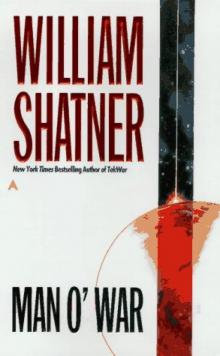 Man O' War
Man O' War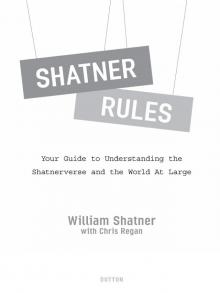 Shatner Rules
Shatner Rules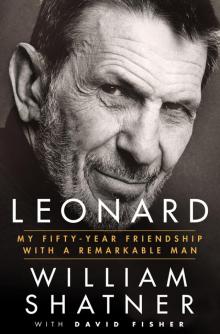 Leonard
Leonard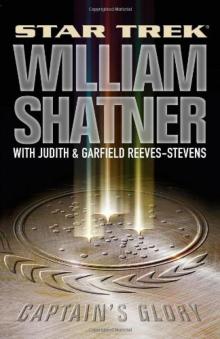 Captain's Glory
Captain's Glory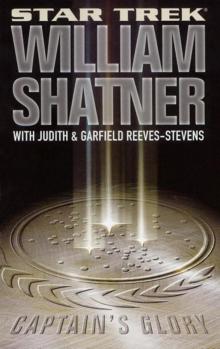 Captain's Glory зпвш-9
Captain's Glory зпвш-9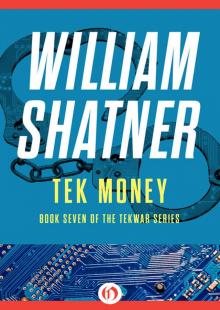 Tek Money
Tek Money Spirit of the Horse
Spirit of the Horse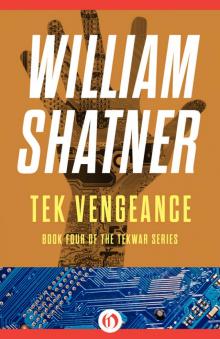 Tek Vengeance
Tek Vengeance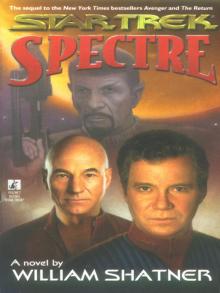 Spectre
Spectre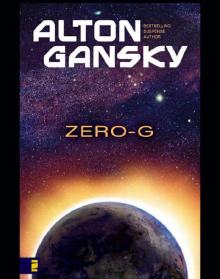 Zero-G
Zero-G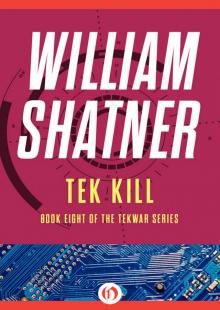 Tek Kill
Tek Kill Collision Course
Collision Course TekLab
TekLab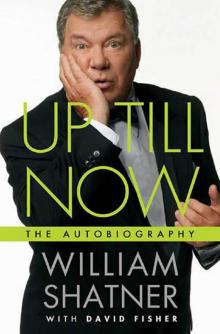 Up Till Now
Up Till Now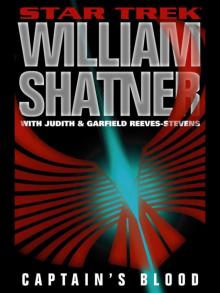 Captain's Blood
Captain's Blood TekWar
TekWar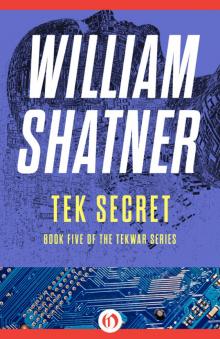 Tek Secret
Tek Secret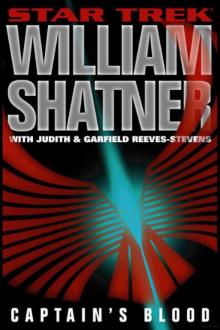 Captain's Blood зпвш-8
Captain's Blood зпвш-8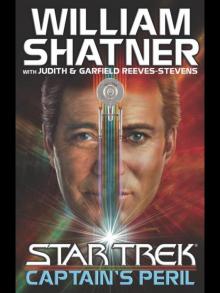 Captain's Peril
Captain's Peril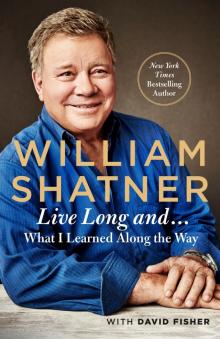 Live Long and . . .
Live Long and . . .